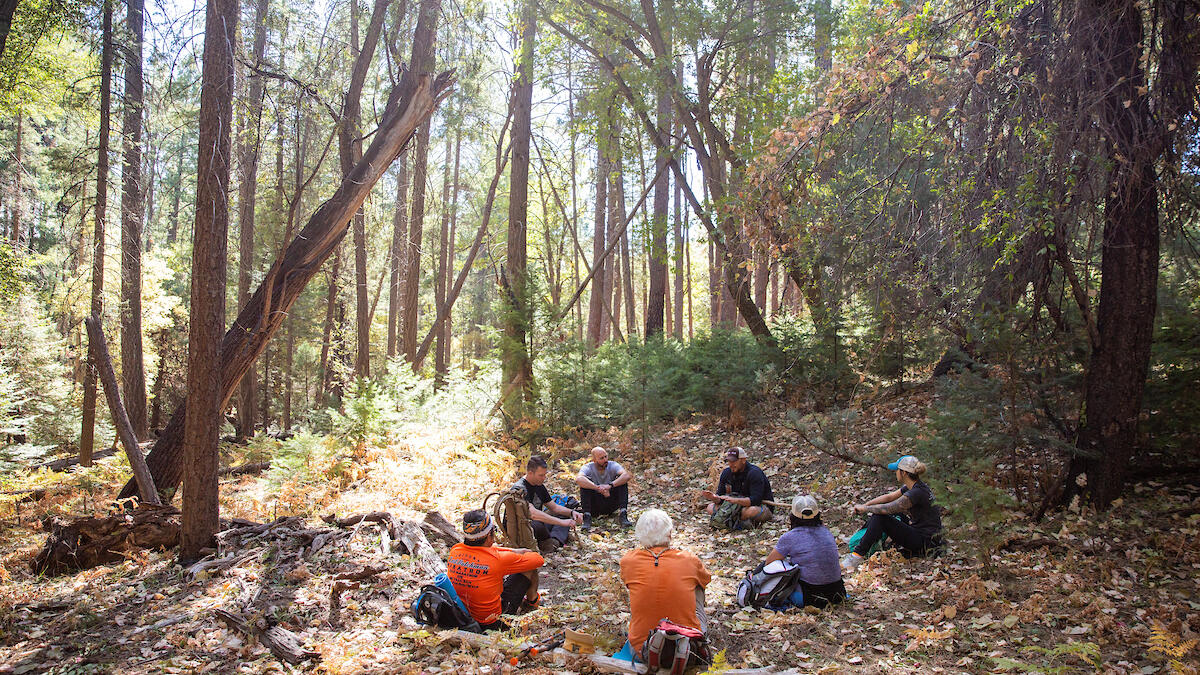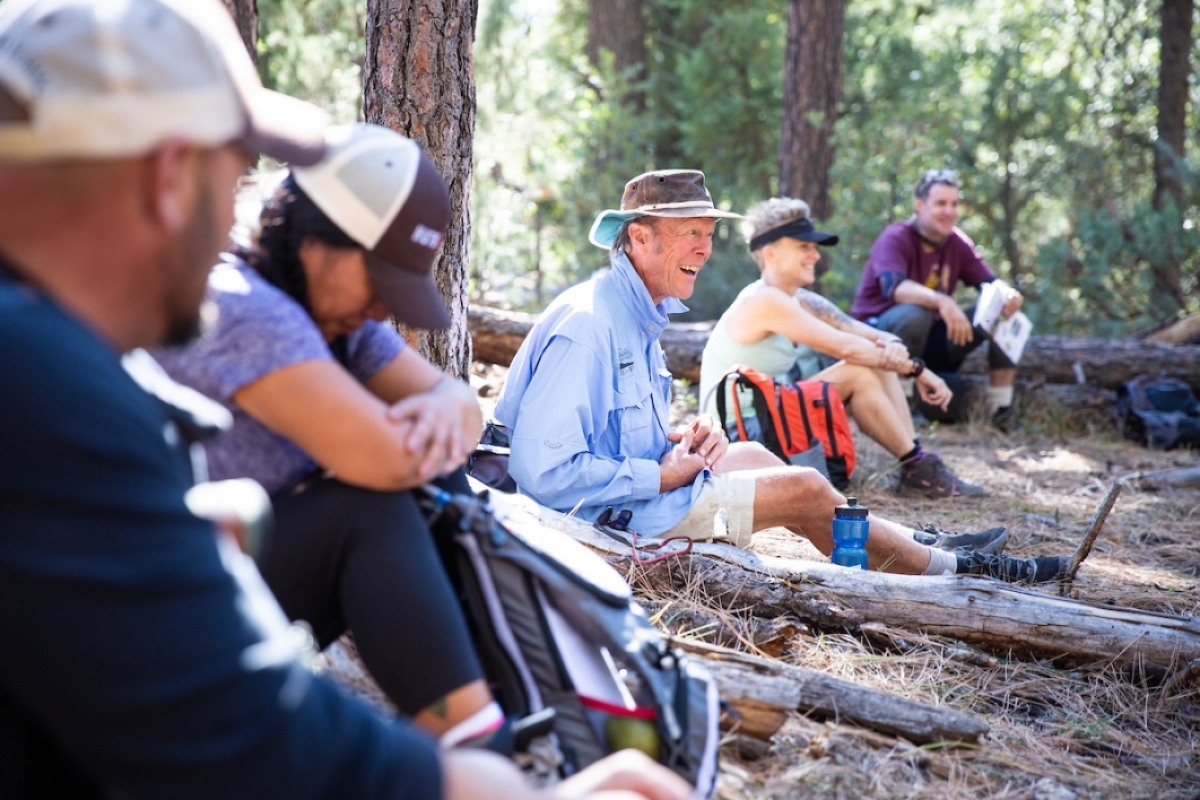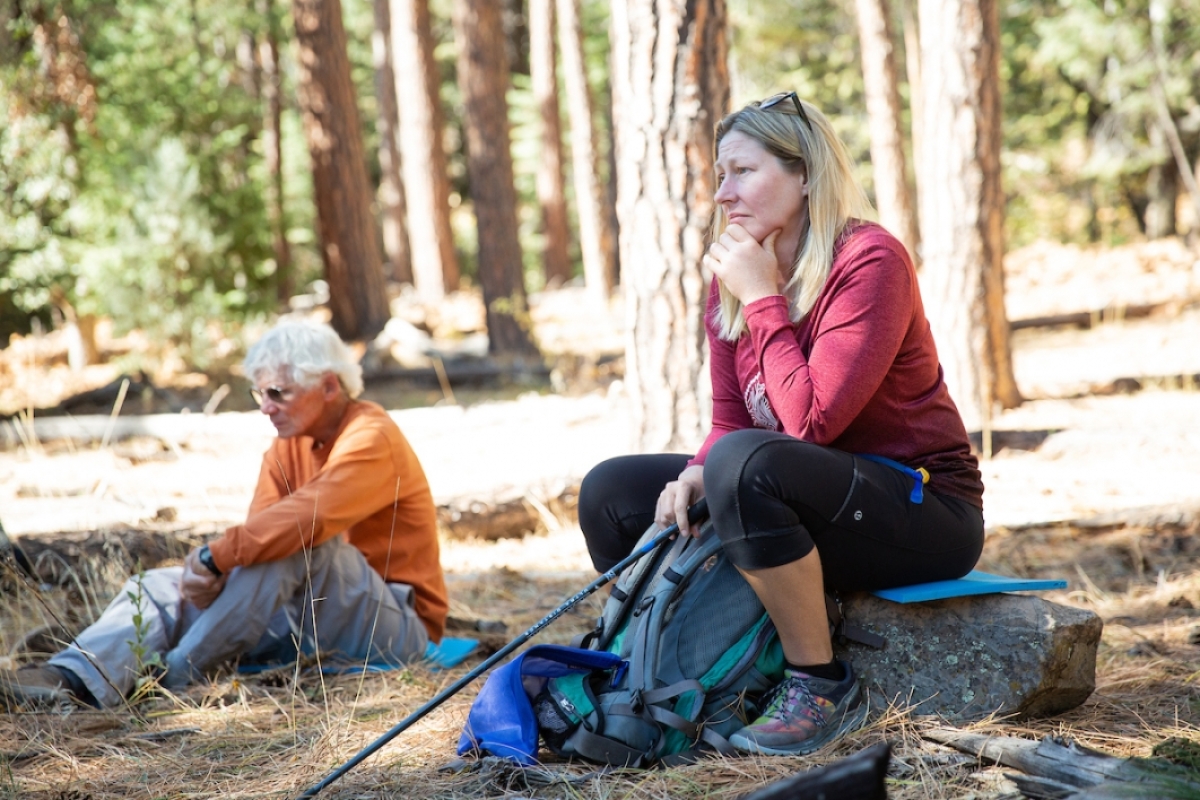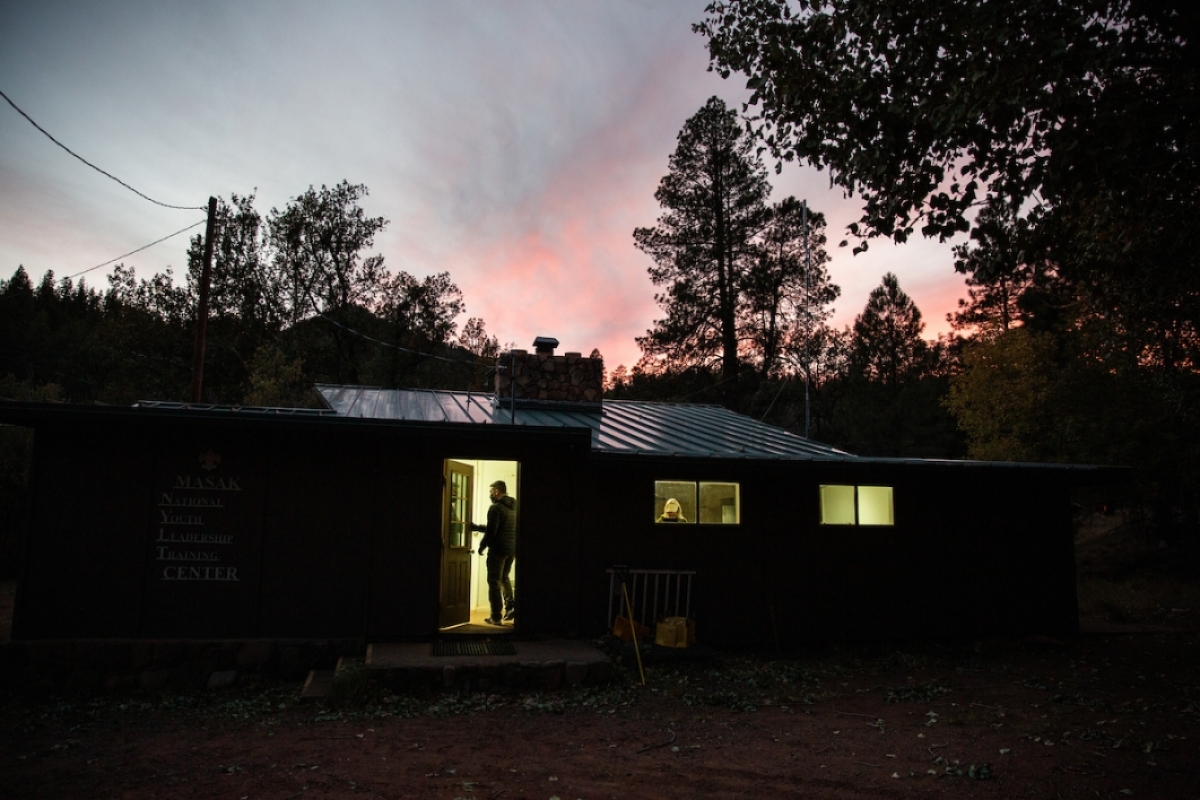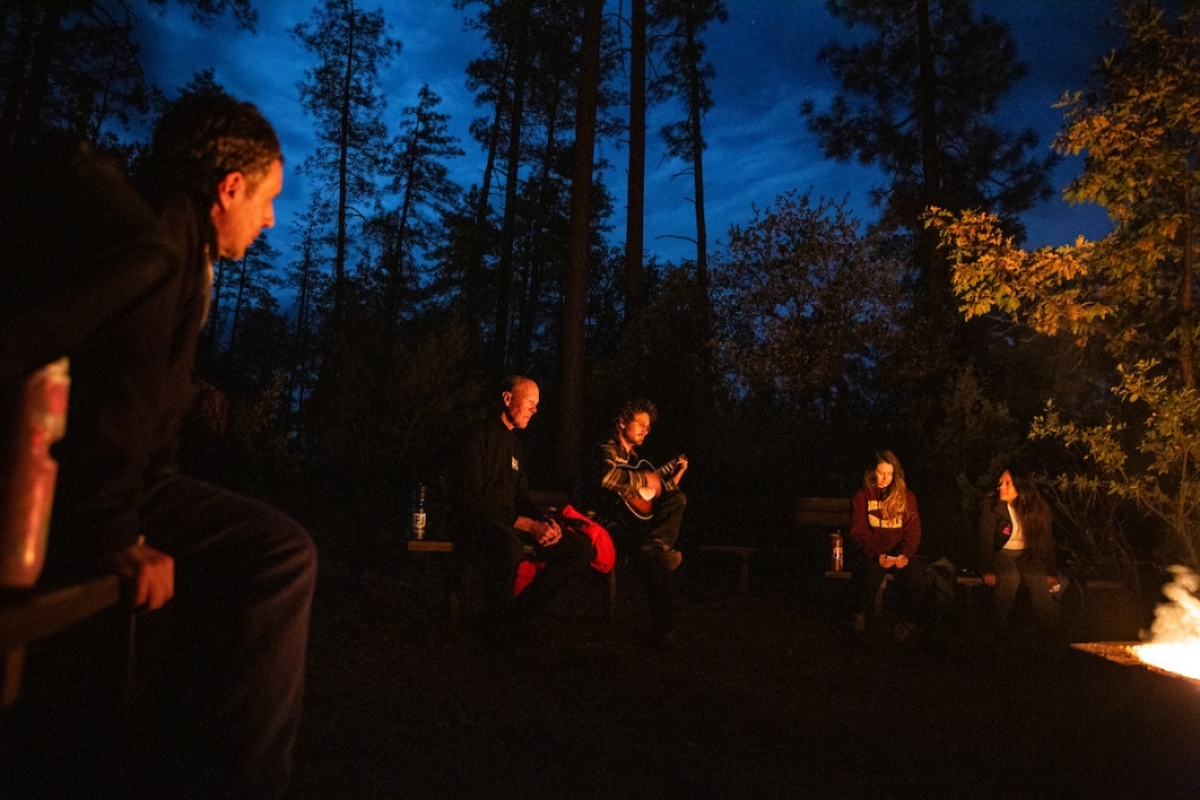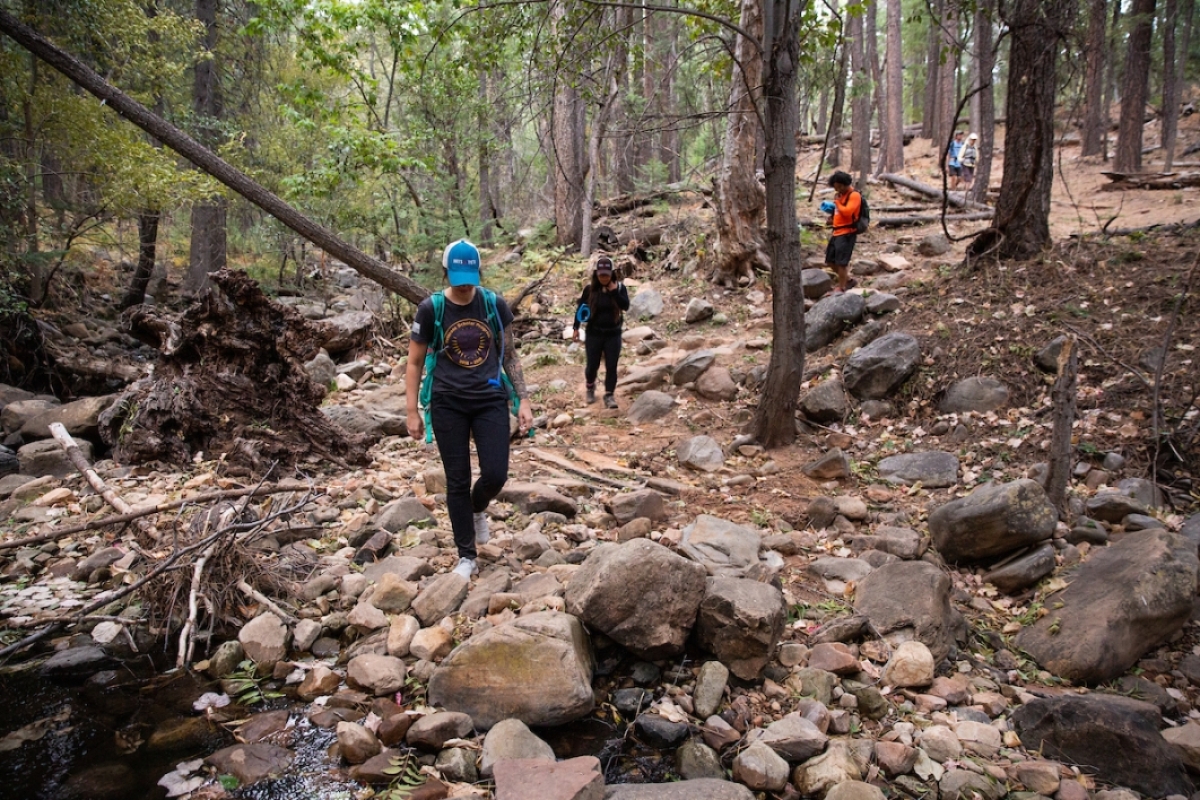The wilderness therapy program Huts for Vets allows veterans to commune with nature in the Colorado Rockies and experience a perspective shift to more fully integrate with civilian life.
Now Arizona State University's Office for Veteran and Military Academic Engagement is adopting that model, swapping the mountainous Rockies for Arizona’s Mogollon Rim.
They are calling it the Arizona Warriors’ Wilderness Journey, and it's showing great promise for ASU veterans.
“It’s been a healing process for me, because it’s hard to put yourself in a vulnerable situation because it’s uncomfortable,” said Melvin Cruz, a public service and public policy major and Army veteran who saw combat in Iraq.
Cruz was one of 14 participants in the Arizona Warriors' Wilderness Journey pilot program. “Veterans often like to control their environments but this opportunity allowed me to let people in, which has been a long time coming.”
And so has the journey.
Offered by ASU’s Office for Veteran and Military Academic Engagement and funded by the Arizona Department of Veterans’ Services as made available through the Arizona Veterans’ Donation Fund, the four-day retreat (Oct. 29–Nov. 2) was several years in the making.
ASU veterans have participated in Huts for Vets since 2018. Based in Aspen, Colorado, the program has offered men and women a total immersion in nature, literature-based philosophical exploration, contemplative thought and camaraderie, with a curriculum designed for reflection, introspection, resilience, empowerment and even transcendence at 12,000 feet.
Video by Deanna Dent/ASU Now
“As a species, man has lived in wilderness settings a thousand times longer than it has in an industrial setting. Wilderness offers a homecoming to the nurturing womb of our common genesis,” said Paul Andersen, Huts for Vets founder and executive director. Andersen started the nonprofit in 2013 with support from the Aspen Institute, an international think tank and global forum that has attracted presidents, statesmen, diplomats, judges, ambassadors and Nobel laureates to the Rockies. “Nature is about connecting with a sense of self, and it can defined by a natural wilderness setting. It’s healing for veterans because nature works on the mind, body and spirit, especially for veterans who engage with a peer group of qualified listeners.”
Andersen initiated the Aspen Institute's Nature and Society Executive Seminar in 2004 for corporate executives, policymakers and educators because he wanted them to have a deeper understanding of our relationship with nature in order to make more enlightened decisions on their boards. Even though these powerful people had to trade a soft pillow and comfortable bed for a bunk in a cabin, many found that exposure to wilderness was reinvigorating and afforded a new sense of purpose. Researchers have also found that nature immersion can reduce stress and cortisone levels, slow down heart rates, and improve various functions of the immune system and brain activity.
The Japanese term for this “shinrin-yoku,” which translates literally to "forest bathing" and is a medical prescription for Japan’s often overstressed work force. Physicians there often prescibe shinrin-yoku by guiding patients to Japan’s old growth forests for therapeutic healing in what is considered one of the most industrialized nations in the world.
After reading an article based on a 2016 report published by the U.S. Department of Veterans Affairs, Andersen felt military veterans returning home from service or combat could benefit from this practice. The report, which reviewed and analyzed 55 million veterans’ records over a 35-year period, estimated that almost 20 veterans per day were being lost to suicide. Today, that number is up to 22 veteran suicides a day.
A protester of the Vietnam War in the 1960s, Andersen felt compelled to take action.
“Veterans who served in combat are suffering from moral injury from either what they saw, did or were complicit in. Many can benefit from a new source of life energy in order to be living people again,” Anderson said. “This is a moral issue, a social justice issue, and something we need to address and offer some kind of solution.”
Nancy Dallett, associate director of the Office for Veteran and Military Academic Engagement, believes this program is a piece of the healing puzzle. Dallett said transitioning from military service to civilian life is rife with life-changing opportunities and challenges. Members of the military are part of a large mission, they train and serve in an intensely hierarchal system, live a very structured life and form close bonds with one another. As civilians, they lose that camaraderie, especially in academic life.
“After sending student-veterans to the Rockies for several years, we heard from the participants, without exception, that the experience was profound, transformative and inspiring for them,” Dallett said. “In turn, they inspired us to collaborate with Huts for Vets and experiment whether we could increase opportunities for more student-veterans closer to home in Arizona's magnificent landscapes.”
It sounded great, but the timing wasn’t good. The COVID-19 pandemic weighed heavy on everyone’s minds, said Manuel G. Aviles-Santiago, director of the Office for Veteran and Military Academic Engagement.
"In spite of COVID-19 we pushed ahead, and with the help of experts throughout ASU we put in place health and safety protocols to protect the participants and enable the program to happen,” Aviles-Santiago said.
Before any of the 14 participants met in Tonto National Forest, they took a COVID-19 test. Many of them were able to take advantage of the rapid saliva test made available through The Biodesign Institute at all four ASU campuses. No one tested positive and they were able to interact freely during the wilderness journey. The crew was also tested when they got back to ASU as an additional protocol. All of the results came back negative.
The goal of the retreat was to establish a familiarity with the Huts for Vets methodology so it can be replicated for a target audience of military-affiliated students, staff and faculty at ASU.
Andersen did a pilot run with 14 military-affiliated members of the ASU community in the Tonto National Forest, where ASU will schedule a full retreat with student-veterans in spring 2021. The purpose of this trip was to train future advisers and facilitators who can employ nature-based discussions as a retention strategy for veterans in their post-traumatic growth journey.
The training session was necessary, said Michelle Loposky, assistant director of Outreach and Engagement for ASU’s Pat Tillman Veterans Center.
“This first trip is mostly for people in academia because we wanted to examine all of the intricate things and different layers before it’s presented to the student-veterans,” said Loposky, a former U.S. Army combat field medic who was deployed after the Bosnian war in the Stabilization Force humanitarian efforts in Bosnia and Herzegovina. “We want our program to be purposeful because we want it to also be impactful. We want our student-veterans who just got out to need this even if they don’t think they need it. They’ll walk away saying, ‘I’m glad I did this.’”
Dan Shilling, a Vietnam veteran who has served on several committees and commissions at ASU, said he was glad he did it as well. An avid hiker, sustainability instructor and author, Shilling believes the forest setting is conducive to veterans.
“Nature doesn’t judge because nature is so welcoming,” said Shilling, who was given the Distinguished Alumnus Award by ASU in 2005 for his service to the school and state. “The setting paired with the readings serve as a springboard. They seem to open a window and from there, the emotions just seem to flow out.”
But it took time to get to that place.
The first morning commenced with an 8-mile hike along the Mogollon Rim, which started at the Pine Trailhead and finished seven hours later at Camp Geronimo. The hike offered spectacular views of Arizona’s vistas, which can reach up to 7,000 feet. It was interspersed with plenty of stops for reading and discussion sessions based on the works of writers and poets such as Henry David Thoreau, Edward Abbey, Robert Frost, Cara Hoffman, Viktor Franki, Auden Schendler, and Chief Luther Standing Bear. The idea is to elicit philosophical musings as a means of exploring issues many veterans face, while also allowing unstructured conversations during the course of the trip.
“There’s always this awkwardness when you start because many of us did not know each other when we started the hike,” said Shawn Banzhaf, a senior military advocate at ASU’s Pat Tillman Veterans Center who participated in the two previous Huts for Vets programs in the wilderness near Aspen. “Out on the trail you start to have these really in-depth conversations and you find out what people are passionate about. By about the third day, it’s like you’re long-lost friends, battle buddies.
“The idea is for our student-veterans to go on this wilderness journey so they can start the semester with a battle buddy.”
The days that followed were filled with group hikes, solo meditations, further readings and discussions, group meals, nightly campfires, and ideally, a sense of esprit de corps.
For Patricia Murphy, a poet, author and principal lecturer with the College of Integrative Sciences and Arts, the goal of the trip was different.
“I wasn’t here to teach. I was a student and I was very deliberate in that,” said Murphy, founding editor of Superstition Review, ASU’s online literary magazine. “I’m here to connect with others and understand their trauma and their experiences. I came here to be more present for those who need me.”
That included Cruz, whose transformation by the end of the trip was palpable to everyone, including himself.
“For a few years I’ve been walking around with this inner turmoil inside of my head and many veterans are like me. We don’t often talk to people about our problems because either we think they can’t relate or we’ll be judged,” Cruz said. “Having that human connection with other veterans allows you to feel understood, so you feel more comfortable and allow yourself to breathe and relax.
“This experience opened up a lot of feelings and emotions that I had down deep. Sometimes veterans just need a positive push. Everyone from this trip is going away with something positive, and I just love that they gave each of us that seed.”
Top photo: Veterans sit together at the side of Webber Creek to discuss service and returning to civilian life along with several other subjects on Oct. 31, 2020. Huts for Vets organized an Arizona experience including veterans and civilians for a program of hiking, readings and discussions near Camp Geronimo outside of Payson, Arizona, on the Mogollon Rim. Photo by Deanna Dent/ASU
More Health and medicine

Reducing waste in medical settings
Health care saves lives, but at what cost? Current health care practices might be creating a large carbon footprint, according to ASU Online student Dr. Michele Domico, who says a healthier…

ASU offers bilingual counseling to Spanish speakers
Arizona is one of the five states in the nation with the highest percentage of Hispanic residents, according to the U.S. Department of Health and Human Services Office of Minority Health, and …

College of Health Solutions launches first-of-its-kind diagnostics industry partnership to train the workforce of tomorrow
From 2007 to 2022, cytotechnology certification examinees diminished from 246 to 109 per year. With only 19 programs in the United States, the cytology workforce that stands at the front line of…


